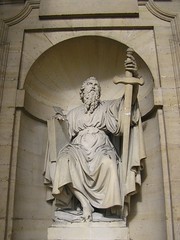1st Corinthians Chapter 1

![]()
![]()
![]()
Paul opens his letter by thanking God for the church body at Corinth.
Why does he do this?
He thanks God for the grace given to them in Jesus.
If it were not for sinners (the church body), Jesus would not have had to come and therefore couldn't have saved Paul.
He says that in Christ our speaking and our wisdom is enriched in every way, meaning that our wisdom and our speaking ability is complete in the belief of Christ.
Meaning, that if we abide in Christ for our speaking ability and our wisdom, we will fully possess the means necessary to deliver His word to other people
He then exhorts them by telling them that God is faithful and Christ will keep them strong so that they will be blameless on His day of judgment.
In verse 10 Paul appeals to the body that they agree with each other so that there won't be division among them.
Baptism was a very big deal in the early church and people tended to put high esteem on the people that baptized them.
In verses 14 and 15 Paul says "I am thankful that I did not baptize any of you except Crispus and Gaius, so no one can say that you were baptized into my name."
Paul is referring to verse 12 where he says "What I mean is this: One of you says, "I follow Paul"; another, "I follow Apollos"; another, "I follow Cephas"; still another, "I follow Christ.""
They were missing the point that Christ is the head of the church and everyone else is below Him.
Paul asks them in verse 13 "Is Christ divided? Was I crucified for you?"
He is telling them that only Christ was crucified, not Paul, or Apollos nor Cephas.
Therefore Christ is the only one they should follow.
in verse 17 he says "For Christ did not send me to baptize, but to preach the gospel—not with words of human wisdom, lest the cross of Christ be emptied of its power."
Meaning that if he were to teach the people to follow him, or human wisdom, instead of Christ, he would be deflating the crucifixion event of all its power. making Christ's death a pointless action.
In verse 18 Paul stops talking about the division issue and goes on to talk about the wisdom of God compared to the wisdom of man.
In verse 21 Paul says "For since in the wisdom of God the world through its wisdom did not know Him, God was pleased through the foolishness of what was preached to save those who believe."
He is saying that it was God's idea that the world though its own version of "wisdom" could not know God.
Therefore we must be "foolish" in the ways of the world in order to accept God,
therefore God is pleased with the foolishness of the gospel because it saves those who believe.
in verse 24 it says "Christ is the power of God and the wisdom of God"
we can use the word Christ interchangeably with Power of God and with Wisdom of God.
in verse 26 Paul says "Think of what you were when you were called. You were not wise by human standards."
Think about what you were when you were called.
Think about it.
Where were you?
What were you doing?
Maybe you're not presently walking with the lord
Maybe this is the most foolish you've ever been in your entire life
maybe that's why He's calling you.
Paul says they were not wise by human standards when they were called.
He was talking about the moment immediately after they had chosen to follow Christ.
They were now foolish by the world's way of thinking. (If they hadn't been already)This implies they they were wise by not human standards.
You see the wisdom of God and the wisdom of man are not the same.
referring back to verse 21, we see that the wisdom of God, which is Christ, is foolishness to the world.
in verse 27 he says "God chose the "foolish" things to shame the wise so that no one may boast."
Paul is meaning here is that God chose people who were foolish to the world before they were called, to be foolish to the world after they were called to show that they didn't need man's wisdom to be truly wise.
Initially they were foolish to the world and to God, but after they were called, they were only foolish to the world.
He chose the foolish to keep them humble so they couldn't say that it was anything they did themselves.
It was solely through Christ that they had any wisdom whatsoever. Therefore they could not boast of themselves, but as verse 31 says they could boast in the Lord.